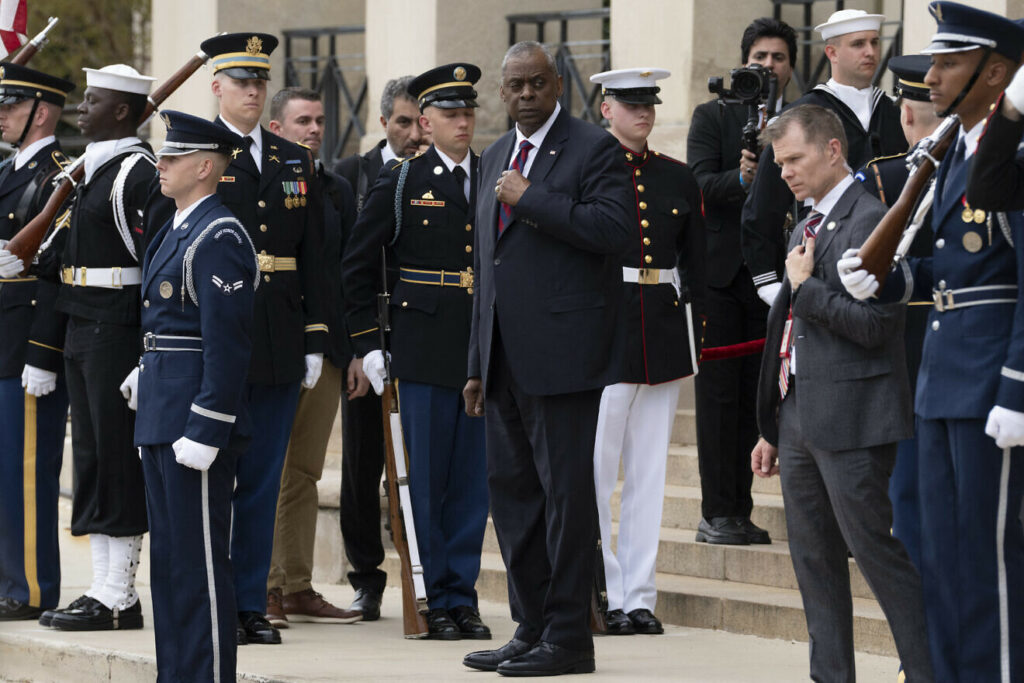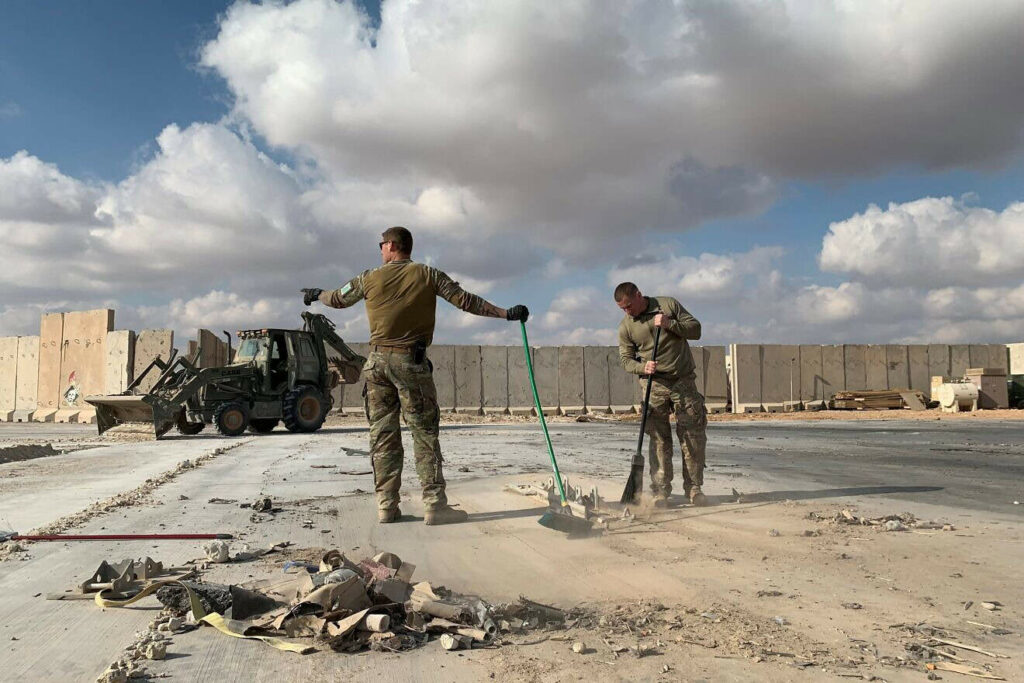
Reduction of US presence in Iraq likely to embolden Iranian axis, ISIS
A drawdown of U.S. military presence would strengthen Iran and likely lead to a resurgence of ISIS, Israeli and U.S. observers tell JNS.
The United States and Iraq have been engaged in talks aimed at transitioning the U.S.-led international military coalition in Iraq into a bilateral partnership, a process that has been delayed due to the ongoing Israel-Hamas conflict.
These discussions will determine the future of U.S. military presence in Iraq, a country that Iran intends to take over with the help of its Shi’ite-backed militias, and which remains a critical battleground in the fight against Islamic State.
American officials have reiterated that U.S. military personnel are in Iraq at the invitation of the Iraqi government as part of “Operation Inherent Resolve” to advise, assist and enable the Iraqi security forces in their ongoing fight against ISIS. However, signs are growing that the Biden administration—as well as potentially any administration that follows it—would seek to either draw down or entirely remove the American military footprint in the country, with consequences for the entire region.
The United States currently maintains approximately 2,500 troops in Iraq. Additionally, around 900 U.S. personnel are stationed in neighboring Syria, where they continue to play a critical role in counterterrorism operations.
Bradley Bowman, senior director of the Center on Military and Political Power at the Washington-based Foundation for Defense of Democracies, and a former national security advisor to members of the Senate Armed Services and Foreign Relations committees, cautioned against repeating the mistakes of the past in both Iraq and Afghanistan, which enabled radical jihadist forces to fill vacuums.
“The primary reason the U.S. military is in Iraq is to prevent a return of the ISIS caliphate,” said Bowman, who was an active-duty U.S. Army officer, Black Hawk pilot and assistant professor at West Point. “Let’s hope this administration does not force us to endure a sequel of the tragic movie we’ve seen before—a premature U.S. military withdrawal that ignores the advice of commanders and neglects conditions on the ground,” he told JNS.

Bowman drew parallels to the U.S. withdrawal from Iraq in 2011 and Afghanistan in 2021, both of which, he argued, led to significant security setbacks. “That misguided decision to withdraw from Iraq in 2011 catalyzed a series of events that resulted in the ISIS caliphate, eventually forcing the U.S. military to return later to Iraq at a higher cost,” he said.
He noted that the Biden administration risks making the same mistake by withdrawing troops without fully considering the consequences. “In both cases, in Iraq and Afghanistan, we saw a predictable and forewarned disaster,” he added.
The prospect of a U.S. military drawdown in or withdrawal from Iraq has also raised concerns about Iran’s influence.
“The Islamic Republic of Iran wants the U.S. military out of the way,” Bowman stated. He explained that the U.S. presence in Iraq acts as a significant impediment to Tehran’s strategic objectives, which include exerting greater control over Baghdad and using supply lines to arm its proxies in next-door Syria, as well as Hezbollah in Lebanon. “Iran would like to make Iraq like Lebanon, where Tehran uses its terror proxy to undermine national sovereignty and control government decisions,” he explained.
“If you think about it from a Sunni Iraqi perspective—if you have a U.S. military withdrawal from Iraq, what is that going to do? That is going to make you fearful that you have an Iranian takeover in Baghdad. Shi’ites aligned with Iran are going to be perceived as ascendant, and that’s going to make some Sunnis more susceptible to ISIS radicalization and recruitment. So, the obvious consequence, the predictable consequence, of a U.S. military withdrawal from Iraq is more effective ISIS radicalization and recruitment of Sunnis,” Bowman warned.
He pointed to a July 16, 2024, release by U.S. Central Command that warned that “ISIS is on pace to more than double the total number of attacks they claimed in 2023.” The U.S. combatant command responsible for the Middle East said, “The increase in attacks indicates ISIS is attempting to reconstitute following several years of decreased capability.”
“To make matters worse, if there is a credible perception that the prospective U.S. military withdrawal is in response to the more than 170 attacks on U.S. forces in Iraq, Syria, and Jordan since mid-October, then the take-home lesson for Iran and its terror proxies is that aggression against Americans pays,” added Bowman. “That will invite more attacks on Americans.”
Professor Eytan Gilboa, an expert on U.S.-Israeli relations at Bar-Ilan University and a senior fellow at the Jerusalem Institute for Strategy and Security, echoed similar concerns regarding a potential U.S. withdrawal.
“The Iranians and their media outlets are pushing for a complete U.S. withdrawal,” he said. He also warned that a reduction in U.S. forces could lead to increased ISIS activity and further destabilize the region.

“It’s clear that if the United States pulls out, ISIS attacks will intensify,” he said, noting that U.S. forces are being targeted by radical Shi’ite Iranian-backed militias while they remain in Iraq to combat Sunni ISIS.
On Aug. 13, Pentagon spokesman Maj. Gen. Pat Ryder said that eight U.S. service members had been treated for traumatic brain injury and smoke inhalation following an Aug. 9 drone attack on the Rumalyn Landing Zone base in Syria, adding that an Iran-backed militia had launched the attack.
Gilboa also highlighted the strategic significance of the U.S. presence in Iraq, particularly in relation to Israel and other U.S. allies in the region. “Any move that strengthens Iran and its proxies harms Israel’s national security,” he stated.
Gilboa warned that if the U.S. withdraws, Iraq could become a failed state similar to Lebanon and Yemen, where Iranian-backed militias exert significant influence. “The American presence is a buffer that helps prevent the full takeover of Iraq by Iranian forces,” he explained.
Gilboa questioned whether planners in Washington were thinking about the long-term consequences of such an action.
He assessed that Washington could be keen to pull out of Iraq no matter who wins the next presidential elections in November, adding, “If Kamala Harris wins, she will not continue the Biden policies. Trump, for his part, has said that he will continue his actions from his first term, but that’s also unlikely. People change, and both could be susceptible to isolationist influences.”
As the future of the American footprint in Iraq appears uncertain, the stakes are high.
The potential for a U.S. withdrawal raises concerns that go beyond the resurgence of ISIS, and which touch on increased Iranian influence and effects on U.S. allies—including Jordan, which Iran has attempted to infiltrate, destabilize and use as an arms conduit via Iraq to the east.
These discussions will determine the future of U.S. military presence in Iraq, a country that Iran intends to take over with the help of its Shi’ite-backed militias, and which remains a critical battleground in the fight against Islamic State.
American officials have reiterated that U.S. military personnel are in Iraq at the invitation of the Iraqi government as part of “Operation Inherent Resolve” to advise, assist and enable the Iraqi security forces in their ongoing fight against ISIS. However, signs are growing that the Biden administration—as well as potentially any administration that follows it—would seek to either draw down or entirely remove the American military footprint in the country, with consequences for the entire region.
The United States currently maintains approximately 2,500 troops in Iraq. Additionally, around 900 U.S. personnel are stationed in neighboring Syria, where they continue to play a critical role in counterterrorism operations.
Bradley Bowman, senior director of the Center on Military and Political Power at the Washington-based Foundation for Defense of Democracies, and a former national security advisor to members of the Senate Armed Services and Foreign Relations committees, cautioned against repeating the mistakes of the past in both Iraq and Afghanistan, which enabled radical jihadist forces to fill vacuums.
“The primary reason the U.S. military is in Iraq is to prevent a return of the ISIS caliphate,” said Bowman, who was an active-duty U.S. Army officer, Black Hawk pilot and assistant professor at West Point. “Let’s hope this administration does not force us to endure a sequel of the tragic movie we’ve seen before—a premature U.S. military withdrawal that ignores the advice of commanders and neglects conditions on the ground,” he told JNS.
Bowman drew parallels to the U.S. withdrawal from Iraq in 2011 and Afghanistan in 2021, both of which, he argued, led to significant security setbacks. “That misguided decision to withdraw from Iraq in 2011 catalyzed a series of events that resulted in the ISIS caliphate, eventually forcing the U.S. military to return later to Iraq at a higher cost,” he said.
He noted that the Biden administration risks making the same mistake by withdrawing troops without fully considering the consequences. “In both cases, in Iraq and Afghanistan, we saw a predictable and forewarned disaster,” he added.
The prospect of a U.S. military drawdown in or withdrawal from Iraq has also raised concerns about Iran’s influence.
“The Islamic Republic of Iran wants the U.S. military out of the way,” Bowman stated. He explained that the U.S. presence in Iraq acts as a significant impediment to Tehran’s strategic objectives, which include exerting greater control over Baghdad and using supply lines to arm its proxies in next-door Syria, as well as Hezbollah in Lebanon. “Iran would like to make Iraq like Lebanon, where Tehran uses its terror proxy to undermine national sovereignty and control government decisions,” he explained.
“If you think about it from a Sunni Iraqi perspective—if you have a U.S. military withdrawal from Iraq, what is that going to do? That is going to make you fearful that you have an Iranian takeover in Baghdad. Shi’ites aligned with Iran are going to be perceived as ascendant, and that’s going to make some Sunnis more susceptible to ISIS radicalization and recruitment. So, the obvious consequence, the predictable consequence, of a U.S. military withdrawal from Iraq is more effective ISIS radicalization and recruitment of Sunnis,” Bowman warned.
He pointed to a July 16, 2024, release by U.S. Central Command that warned that “ISIS is on pace to more than double the total number of attacks they claimed in 2023.” The U.S. combatant command responsible for the Middle East said, “The increase in attacks indicates ISIS is attempting to reconstitute following several years of decreased capability.”
“To make matters worse, if there is a credible perception that the prospective U.S. military withdrawal is in response to the more than 170 attacks on U.S. forces in Iraq, Syria, and Jordan since mid-October, then the take-home lesson for Iran and its terror proxies is that aggression against Americans pays,” added Bowman. “That will invite more attacks on Americans.”

Professor Eytan Gilboa, an expert on U.S.-Israeli relations at Bar-Ilan University and a senior fellow at the Jerusalem Institute for Strategy and Security, echoed similar concerns regarding a potential U.S. withdrawal.
“The Iranians and their media outlets are pushing for a complete U.S. withdrawal,” he said. He also warned that a reduction in U.S. forces could lead to increased ISIS activity and further destabilize the region.
“It’s clear that if the United States pulls out, ISIS attacks will intensify,” he said, noting that U.S. forces are being targeted by radical Shi’ite Iranian-backed militias while they remain in Iraq to combat Sunni ISIS.
On Aug. 13, Pentagon spokesman Maj. Gen. Pat Ryder said that eight U.S. service members had been treated for traumatic brain injury and smoke inhalation following an Aug. 9 drone attack on the Rumalyn Landing Zone base in Syria, adding that an Iran-backed militia had launched the attack.
Gilboa also highlighted the strategic significance of the U.S. presence in Iraq, particularly in relation to Israel and other U.S. allies in the region. “Any move that strengthens Iran and its proxies harms Israel’s national security,” he stated.
Gilboa warned that if the U.S. withdraws, Iraq could become a failed state similar to Lebanon and Yemen, where Iranian-backed militias exert significant influence. “The American presence is a buffer that helps prevent the full takeover of Iraq by Iranian forces,” he explained.
Gilboa questioned whether planners in Washington were thinking about the long-term consequences of such an action.
He assessed that Washington could be keen to pull out of Iraq no matter who wins the next presidential elections in November, adding, “If Kamala Harris wins, she will not continue the Biden policies. Trump, for his part, has said that he will continue his actions from his first term, but that’s also unlikely. People change, and both could be susceptible to isolationist influences.”
As the future of the American footprint in Iraq appears uncertain, the stakes are high.
The potential for a U.S. withdrawal raises concerns that go beyond the resurgence of ISIS, and which touch on increased Iranian influence and effects on U.S. allies—including Jordan, which Iran has attempted to infiltrate, destabilize and use as an arms conduit via Iraq to the east.
The United States and Iraq have been engaged in talks aimed at transitioning the U.S.-led international military coalition in Iraq into a bilateral partnership, a process that has been delayed due to the ongoing Israel-Hamas conflict.
These discussions will determine the future of U.S. military presence in Iraq, a country that Iran intends to take over with the help of its Shi’ite-backed militias, and which remains a critical battleground in the fight against Islamic State.
American officials have reiterated that U.S. military personnel are in Iraq at the invitation of the Iraqi government as part of “Operation Inherent Resolve” to advise, assist and enable the Iraqi security forces in their ongoing fight against ISIS. However, signs are growing that the Biden administration—as well as potentially any administration that follows it—would seek to either draw down or entirely remove the American military footprint in the country, with consequences for the entire region.
The United States currently maintains approximately 2,500 troops in Iraq. Additionally, around 900 U.S. personnel are stationed in neighboring Syria, where they continue to play a critical role in counterterrorism operations.
Bradley Bowman, senior director of the Center on Military and Political Power at the Washington-based Foundation for Defense of Democracies, and a former national security advisor to members of the Senate Armed Services and Foreign Relations committees, cautioned against repeating the mistakes of the past in both Iraq and Afghanistan, which enabled radical jihadist forces to fill vacuums.
“The primary reason the U.S. military is in Iraq is to prevent a return of the ISIS caliphate,” said Bowman, who was an active-duty U.S. Army officer, Black Hawk pilot and assistant professor at West Point. “Let’s hope this administration does not force us to endure a sequel of the tragic movie we’ve seen before—a premature U.S. military withdrawal that ignores the advice of commanders and neglects conditions on the ground,” he told JNS.
Bowman drew parallels to the U.S. withdrawal from Iraq in 2011 and Afghanistan in 2021, both of which, he argued, led to significant security setbacks. “That misguided decision to withdraw from Iraq in 2011 catalyzed a series of events that resulted in the ISIS caliphate, eventually forcing the U.S. military to return later to Iraq at a higher cost,” he said.
He noted that the Biden administration risks making the same mistake by withdrawing troops without fully considering the consequences. “In both cases, in Iraq and Afghanistan, we saw a predictable and forewarned disaster,” he added.
The prospect of a U.S. military drawdown in or withdrawal from Iraq has also raised concerns about Iran’s influence.
“The Islamic Republic of Iran wants the U.S. military out of the way,” Bowman stated. He explained that the U.S. presence in Iraq acts as a significant impediment to Tehran’s strategic objectives, which include exerting greater control over Baghdad and using supply lines to arm its proxies in next-door Syria, as well as Hezbollah in Lebanon. “Iran would like to make Iraq like Lebanon, where Tehran uses its terror proxy to undermine national sovereignty and control government decisions,” he explained.

(Source: JNS)
“If you think about it from a Sunni Iraqi perspective—if you have a U.S. military withdrawal from Iraq, what is that going to do? That is going to make you fearful that you have an Iranian takeover in Baghdad. Shi’ites aligned with Iran are going to be perceived as ascendant, and that’s going to make some Sunnis more susceptible to ISIS radicalization and recruitment. So, the obvious consequence, the predictable consequence, of a U.S. military withdrawal from Iraq is more effective ISIS radicalization and recruitment of Sunnis,” Bowman warned.
He pointed to a July 16, 2024, release by U.S. Central Command that warned that “ISIS is on pace to more than double the total number of attacks they claimed in 2023.” The U.S. combatant command responsible for the Middle East said, “The increase in attacks indicates ISIS is attempting to reconstitute following several years of decreased capability.”
“To make matters worse, if there is a credible perception that the prospective U.S. military withdrawal is in response to the more than 170 attacks on U.S. forces in Iraq, Syria, and Jordan since mid-October, then the take-home lesson for Iran and its terror proxies is that aggression against Americans pays,” added Bowman. “That will invite more attacks on Americans.”
Professor Eytan Gilboa, an expert on U.S.-Israeli relations at Bar-Ilan University and a senior fellow at the Jerusalem Institute for Strategy and Security, echoed similar concerns regarding a potential U.S. withdrawal.
“The Iranians and their media outlets are pushing for a complete U.S. withdrawal,” he said. He also warned that a reduction in U.S. forces could lead to increased ISIS activity and further destabilize the region.
“It’s clear that if the United States pulls out, ISIS attacks will intensify,” he said, noting that U.S. forces are being targeted by radical Shi’ite Iranian-backed militias while they remain in Iraq to combat Sunni ISIS.
On Aug. 13, Pentagon spokesman Maj. Gen. Pat Ryder said that eight U.S. service members had been treated for traumatic brain injury and smoke inhalation following an Aug. 9 drone attack on the Rumalyn Landing Zone base in Syria, adding that an Iran-backed militia had launched the attack.
Gilboa also highlighted the strategic significance of the U.S. presence in Iraq, particularly in relation to Israel and other U.S. allies in the region. “Any move that strengthens Iran and its proxies harms Israel’s national security,” he stated.
Gilboa warned that if the U.S. withdraws, Iraq could become a failed state similar to Lebanon and Yemen, where Iranian-backed militias exert significant influence. “The American presence is a buffer that helps prevent the full takeover of Iraq by Iranian forces,” he explained.
Gilboa questioned whether planners in Washington were thinking about the long-term consequences of such an action.
He assessed that Washington could be keen to pull out of Iraq no matter who wins the next presidential elections in November, adding, “If Kamala Harris wins, she will not continue the Biden policies. Trump, for his part, has said that he will continue his actions from his first term, but that’s also unlikely. People change, and both could be susceptible to isolationist influences.”
As the future of the American footprint in Iraq appears uncertain, the stakes are high.
The potential for a U.S. withdrawal raises concerns that go beyond the resurgence of ISIS, and which touch on increased Iranian influence and effects on U.S. allies—including Jordan, which Iran has attempted to infiltrate, destabilize and use as an arms conduit via Iraq to the east.
** This article was originally published on JNS.org **
The post Reduction of US presence in Iraq likely to embolden Iranian axis, ISIS appeared first on Israel365 News.
Israel in the News